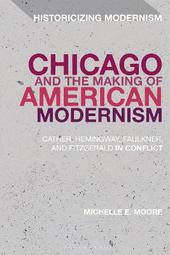
|
Chicago and the Making of American Modernism: Cather, Hemingway, Faulkner, and Fitzgerald in Conflict
Paperback / softback
Main Details
Description
Chicago and the Making of American Modernism is the first full-length study of the vexed relationship between America's great modernist writers and the nation's "second city." Michelle E. Moore explores the ways in which the defining writers of the era-Willa Cather, Ernest Hemingway, William Faulkner and F. Scott Fitzgerald-engaged with the city and reacted against the commercial styles of "Chicago realism" to pursue their own, European-influenced mode of modernist art. Drawing on local archives to illuminate the literary culture of early 20th-century Chicago, this book reveals an important new dimension to the rise of American modernism.
Author Biography
Michelle E. Moore, Ph.D. is Professor of English at the College of Dupage, where she teaches classes in American literature and film. She has published articles in Literature/Film Quarterly, Cather Studies 9 and 11, and Faulkner Studies, and given numerous presentations on American modernism at Modern Language Association conventions and at Modernist Studies Association conferences. She is a member of the Willa Cather Foundation, The Hemingway Society, The Faulkner Society, and the F. Scott Fitzgerald Society and gives papers regularly at their seminars and conferences.
ReviewsMoore's consideration of Faulkner and Fitzgerald is valuable, adding new connections between these important modernist writers and Chicago ... One strength of Moore's work is the use of archival material as evidence of attitudes toward Chicago. * Midwest Modern Language Association * Michelle E. Moore's clear-eyed and engaging study helps us better understand just how much of a modernist Hemingway was by taking us back to the root of that development. Moore's commitment to her subject matter, and the narratives she is able to build from her research, further validates Hemingway's role as an essential American modernist who came of age as a writer not only in Paris, but in the "Wild West" of Chicago, Illinois. * The Hemingway Review * Impressive primary source research...Throughout, Moore's precise attention to historical detail allows her to construct well-rounded portraits of the people behind the fictional Chicago types that populate Fitzgerald's stories, and she convincingly demonstrates how knowing more about the real backgrounds of these people enriches our understanding of Fitzgerald's thematic concerns, especially with respect to labor relations and workers' rights. All in all, in the Fitzgerald chapter, just as with the rest of this remarkable book, Moore offers important contributions to scholarship by highlighting the significance of Chicago-related linkages that without her careful explications readers might otherwise miss. * The F. Scott Fitzgerald Review *
|